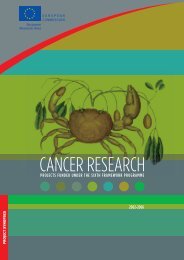I527-290 ESRIF Final Report (WEB).indd - European Commission
I527-290 ESRIF Final Report (WEB).indd - European Commission
I527-290 ESRIF Final Report (WEB).indd - European Commission
You also want an ePaper? Increase the reach of your titles
YUMPU automatically turns print PDFs into web optimized ePapers that Google loves.
232<br />
action. Similarly, actors may respond to positive or negative feedback regarding performance during a crisis, by drawing lessons<br />
and modifying beliefs and practices. Actors commonly attempt to refl ect upon crisis experiences after the fact, draw lessons<br />
for the future, and formulate reform projects on the basis of interpretations of crisis experiences. Crises present considerable<br />
opportunities for learning, but post-crisis learning attempts are often distorted or derailed by a variety of typical social and<br />
psychological dynamics. Can researchers identify ‘best practices’ for organisational learning and change management processes<br />
conducive to sustainable gains of not only contingency-specifi c but also generic crisis management capacity?<br />
11.2.1.2 Societal security and public-private partnerships<br />
We are living in a time when borders between the public and private spheres are re-evaluated, transferred and becoming more<br />
porous. The strain on public fi nances has underpinned an ideological change regarding what the state and the private sphere<br />
should do and vice versa. The new public management (NPM) reform introduced a range of private sector management<br />
instruments into the public sector. Formerly closed markets are now open for private actors in which various forms of close<br />
and durable collaboration between public and private actors are set up. The ambiguous public-private boundary should be<br />
scrutinised further.<br />
The overall research question in this theme is the following: What are the democratic implications, especially concerning democratic<br />
accountability, when the private actors take part in the public domain of the high takes sphere of safety and security?<br />
Public domain is here defi ned as the action sphere in which public and private actors are embedded in a broader institutionalised<br />
arena concerned with the public goods and services. How can a stronger role for for-profi t actors’ in the public domain be<br />
democratically legitimate considering the fact that the private actors cannot be held democratically accountable for the<br />
decisions they make? Indeed, a stronger role for the private actors in the public domain raises questions on the classic dilemma<br />
between effi ciency and democracy or what is sometimes defi ned as the distinction between output legitimacy and input<br />
legitimacy. It is also related to the accountability dilemma. The main justifi cation for giving the private actors an important role<br />
in the fi eld of societal security is that this can make the society less vulnerable and hence more eff ective. However, measures<br />
taken in order to make the society more stable and less vulnerable must also be democratically legitimate which requires<br />
political control. Societal security lies at the very heart of the responsibilities of the state.<br />
11.2.1.3 A shared evaluative model<br />
Crisis management is a diffi cult task that is judged and evaluated with remarkable ease when it is all over. What is lacking is a<br />
normative framework that spells out what we can expect from public leaders and crisis management structures in times of high<br />
stakes, uncertainty, complexity, and urgency. Diff erences between various parts of the Union, comprised of 500 million people,<br />
surely exist. Joint research can fi nd the common ground of shared expectations and minimum standards. Such a shared model<br />
will help design joint capacity to manage trans-boundary crises. Failures of imagination, initiative or coordination will erode<br />
the public credibility of the governing capacity of the Union leadership. Consequential events in Europe, aff ecting the citizens<br />
and their common society, must not become crises of governance for the <strong>European</strong> Union.<br />
11.2.1.4 Supporting actions<br />
The environment of entangled dependencies, where critical functions and nodes on a national, regional and global level rely<br />
on the actions of others, creates a necessity for a well functioning EU response and recovery system. Future trans-boundary<br />
crisis management in the “inter-mestic” EU-domain should not risk leading to “a failure of coordination”. It is imperative to<br />
secure in advance an ability to act eff ectively and legitimately and in concert within this new policy domain for the Union.<br />
Establishing regular joint exercises should be a low cost but high yield investment in improved EU practices, when they matter<br />
the most. Such training eff orts must be founded on research based knowledge, innovative technology and robust methods.<br />
Such exercises would also highlight the need for interoperability in a technical, organisational and cultural sense. It could also<br />
spark useful discussions on standardisation and harmonisation, which should be of interest to industry and to the science and<br />
technology community. Gaps in knowledge, procedures and technology may be identifi ed in such scenario based exercises.<br />
Supporting action is needed on how to enhance inter-organisational coordination through joint training programs. A research-based<br />
program for capacity building and training needs to be established. This will improve cross-sector coordination and ensure a suffi cient<br />
response and recovery capacity to major trans-boundary events in the Union. The goal of the training program should be to link<br />
<strong>ESRIF</strong> FINAL REPORT - PART 2 • Working Group: Human and Societal Dynamics of Security

















